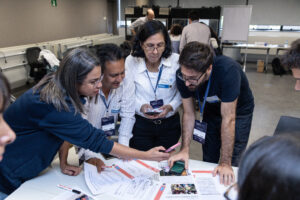Recent Trends in Local Governance Reforms
Last year, a remarkable number of new jurisdictions joined OGP Local, signaling a growing interest in open governance at the local level. To build on this momentum and inspire reformers within and beyond OGP, this blog explores key trends from recent action plans.
Let’s review some of the emerging trends in local open government reforms from all 25 local action plans submitted between April 2023 and January 2025.
What are the Recent Trends in Local Governance Reform?
There are clear patterns among this batch of action plans. In our review, we found that OGP Local members prioritized commitments on public participationGiving citizens opportunities to provide input into government decision-making leads to more effective governance, improved public service delivery, and more equitable outcomes. Technical specificatio..., identified technology as key to implementing reforms, and mainstreamed participatory approaches as part of commitments that focus on other policy areas.
- Public participation: Of the 89 commitments in the reviewed action plans, 36 primarily concentrate on public participation, comprising 40% of all the commitments adopted. These commitments aim to promote civic participation in three ways. First, a number of the commitments establish innovation laboratories where solutions are jointly developed and implemented. Examples include a commitment from Banská Bystrica (Slovak Republic) to increase the integration and use of its CoLaboratory platform in shaping the Municipal Office agenda and the use of THIVIC, a “social innovation laboratory” in Madrid (Spain) that facilitates dialogue between the government and members of the public. A second group of commitments seeks to institutionalize public participation in government structures. Examples include the plan in Valencia (Spain) to create a Municipal Governance Network and participatory spaces and efforts in Baguio (Philippines) to strengthen its People’s Council. Finally, an interesting group of commitments focuses on promoting civic education to bolster civic participation and improve engagement. For example, the State of Goiás (Brazil) has a commitmentOGP commitments are promises for reform co-created by governments and civil society and submitted as part of an action plan. Commitments typically include a description of the problem, concrete action... to promote civic educationAccountability within the public education system is key to improving outcomes and attainment, and accountability is nearly impossible without transparent policies and opportunities for participation ... and increase social participation.
- Use of technology: Another trend is the identification of technology as key to implementing reforms, demonstrating its fast spread in local governance. This is particularly visible among commitments focused on public accountability, access to information, and climate and environment protections. For example, Yogyakarta (Indonesia) has a commitment to create a disaster data app for schools and Pastaza (Ecuador) has a commitment to monitor road construction through an online portal.
- Mainstreaming participation: Finally, OGP Local members are increasingly using participatory approaches in the implementation of the commitments in which public participation is not a prerequisite. For example, Pichincha (Ecuador) committed to co-creating a management model for economic development and Baguio (the Philippines) committed to co-creating a pedestrian traffic manual. The nature of these reforms does not require public participation, but the designers of these commitments have nonetheless sought to benefit from public participation in creating and implementing these activities.
Emerging Spaces for Participation and
Co-creation
Public participation and co-creation are at the heart of OGP’s work. Open government reformers take advantage of public participation and co-creation to facilitate dialogue, appreciate inclusionOGP participating governments are working to create governments that truly serve all people. Commitments in this area may address persons with disabilities, women and girls, lesbian, gay, bisexual, tr... More, ensure effectiveness, and harness support for the meaningful implementation of policies. However, with time, the modes and spaces of participation also change, requiring a fresh look at the emerging practices.
This set of local action plans demonstrate that public participation is ensured through a mix of online and offline spaces. Offline spaces include public consultations and workshops, community town halls, roundtable discussions, multi-stakeholder meetings, and physical resource centers. Online platforms, on the other hand, seem to be expanding beyond traditional tools. Pichincha (Ecuador) and Kakamega County (Kenya) have, for example, used dedicated websites and portals for submissions. Yoff (Senegal) has created online forums and discussion boards while Larena (Philippines) and Dar Chaabane El Fehri (Tunisia) have used social media platforms such as Facebook and X. Lisbon (Portugal) has held virtual town halls and Austin (United States) has used email-based feedback mechanisms and online surveys and polls.
Reformers have also proactively employed a host of different tools and tactics to ensure the inclusion of a wide strata of citizens. For instance, all OGP local members have closely collaborated with civil society organizations to ensure a baseline of civic participation. Some members have taken particularly innovative approaches. Larena (Philippines) and Villaneuva Cortés (Honduras), for example, have prioritized language accessibility (e.g. translations, sign language interpretation, and hosting sessions in local or indigenous languages) to ensure minority groups are well-represented. Banská Bystrica (Slovak Republic) and the State of Goiás (Brazil), on the other hand, have ensured representation of marginalized communities such as women, youths and people with disabilities through proactive outreach. Finally, Austin (United States) has allowed for anonymity in online submissions to encourage honest feedback.
Conclusion
Open governance facilitates informed collective decision-making on the key challenges facing the world today. These local action plans clearly demonstrate that public participation is being institutionalized and technology is increasingly shaping local governance reforms. Reformers, especially at the local level, need to innovatively integrate both into their agendas, at a time when public participation is often facilitated through technology.
No comments yet
Related Content

What Does it Mean to Mainstream Participation in Decision-Making?
In the decades-long discussion of the value of participatory and deliberative democracy, there have regularly been such criticisms of processes not being adequately empowered or connected to decision-making. This blog…

Mainstreaming Public Participation: Three Examples from the Field
Democracies are strengthened by providing members of the public regular opportunities to shape decisions, which they can only do if given the regular opportunities to participate in a manner that…

Participatory Approaches in Digital Governance: Five Examples from the Field
Public participation is critical for building diverse voices into the governance of digital technologies, ensuring that they are trusted and governed in the interests of everyone. This blog will cover…


Leave a Reply